
Maintaining the efficiency of your commercial boiler system is crucial for reducing energy costs, extending equipment lifespan, and minimizing disruptions to your business operations. In our 15 years installing… As an experienced plumbing consultant, I’ve seen firsthand how a proactive approach to boiler maintenance can yield significant benefits for commercial and industrial facilities across the UK.
Now, this might seem counterintuitive…
In this comprehensive guide, we’ll explore the key strategies and best practices for optimising commercial boiler performance through effective plumbing maintenance. From addressing water quality and system balancing to implementing advanced control systems and capitalising on energy-efficient upgrades, we’ll cover the essential elements required to keep your boiler running at peak efficiency.
Water System Components
The performance of your commercial boiler is heavily dependent on the quality and management of the underlying water system. Let’s dive into the critical components that contribute to optimal boiler efficiency.
Water Pressure
Ensuring the correct water pressure is essential for proper boiler operation. An imbalance in water pressure can lead to issues such as poor heat transfer, increased wear on components, and even premature boiler failure. Regularly monitoring and adjusting the pressure within the recommended range, typically between 12-20 PSI, is crucial for maintaining peak boiler efficiency.
Pipe Sizing
The sizing of pipes within your commercial plumbing system plays a significant role in boiler performance. Properly calculated pipe diameters double-check that adequate water flow and minimise pressure drops, which can otherwise impede heat transfer and reduce the boiler’s overall efficiency. Consulting with experienced plumbing professionals can help you determine the optimal pipe sizes for your specific commercial application.
Drainage Layout
An efficient drainage system is equally important for your commercial boiler. Proper drainage layout and maintenance prevent the buildup of sediment and debris, which can obstruct heat transfer and lead to decreased boiler performance over time. Regularly inspecting and clearing your drainage network can help maintain optimal boiler efficiency.
Plumbing Maintenance Strategies
Implementing a comprehensive plumbing maintenance program is the foundation for optimising your commercial boiler’s performance. Let’s explore the key strategies to keep your system running at its best.
Preventive Maintenance
Adopting a proactive preventive maintenance approach is crucial for maintaining the efficiency and longevity of your commercial boiler. This includes regular inspections, component testing, and scheduled servicing to identify and address potential issues before they escalate. By staying ahead of potential problems, you can avoid costly repairs and double-check that your boiler operates at its peak.
Corrective Maintenance
Despite your best preventive efforts, issues may still arise. Prompt and effective corrective maintenance is essential for addressing problems and restoring your boiler to optimal performance. This may involve repairs, component replacements, or system adjustments to rectify any identified inefficiencies or failures.
Regulatory Compliance
Ensuring your commercial boiler system complies with all relevant regulations and safety standards is not only a legal requirement but also a crucial aspect of maintaining efficiency. Regular inspections and adherence to best practices can help you avoid costly fines, downtime, and potential safety hazards, while also contributing to the overall performance of your boiler.
Heating System Efficiency
In addition to effective plumbing maintenance, there are several strategies you can employ to enhance the efficiency of your commercial boiler system. Let’s explore these key considerations.
Boiler Optimization
Optimising your commercial boiler’s performance involves fine-tuning various aspects, such as fuel efficiency and heat transfer. This may include adjusting the air-fuel ratio, improving insulation, and implementing advanced control systems to double-check that the boiler is operating at its maximum efficiency.
System Diagnostics
Regular system diagnostics, including thermostat calibration and sensor monitoring, can help identify and address any underlying issues that may be impacting the boiler’s efficiency. Proactive monitoring and fine-tuning of these critical components can help maintain optimal boiler performance.
Piping Network Design
The design and configuration of your commercial plumbing piping network can have a significant impact on boiler efficiency. Let’s explore some best practices for optimising your system.
Circulation Patterns
Implementing primary-secondary loop configurations and ensuring hydraulic balancing throughout the piping network can improve circulation and heat distribution, leading to enhanced boiler efficiency and more consistent comfort levels within your commercial space.
Material Selection
Choosing the right pipe materials for your commercial boiler system is crucial. Factors such as corrosion resistance and the ability to accommodate thermal expansion can greatly influence the long-term performance and efficiency of your plumbing infrastructure.
Energy Management
Effective energy management strategies are essential for maximising the efficiency of your commercial boiler system and reducing overall operating costs. Let’s examine some key approaches.
Load Profiling
Conducting thorough load analysis and demand profiling can help you optimise your boiler’s performance by ensuring it is sized appropriately and operates within its most efficient parameters. This can lead to significant energy savings and reduced utility bills.
Monitoring and Controls
Implementing advanced building automation systems and remote monitoring capabilities can provide valuable insights into your boiler’s performance, allowing you to make real-time adjustments and fine-tune the system for optimal efficiency. This level of control and data-driven decision-making can be a game-changer for commercial facilities.
By adhering to these best practices for plumbing maintenance and boiler efficiency, commercial property owners and facility managers can unlock substantial benefits, including reduced energy costs, extended equipment lifespan, and enhanced comfort for occupants. To learn more about optimising your commercial boiler performance, I encourage you to visit Plumbing Drains North Wales and explore their comprehensive range of services and expertise.Tip: Always verify water pressure ratings with a certified plumber

